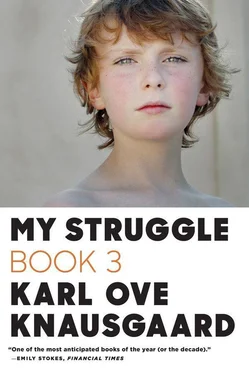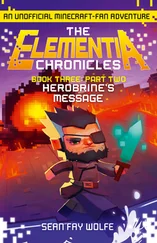The next morning Grandad came in and asked if we would like to help pull up the fishing nets. We did, and a few minutes later we followed him down the path to the fjord, carrying an empty, white tub between us.
The boat was moored to a red float in the water. The mist was so dense it seemed to be hovering in the air. Grandad pulled the boat ashore, we jumped on board, and after he had shoved off with an oar against the bottom Yngve sat down on the thwart by the oarlocks and began to row. Grandad sat at the stern directing him whenever necessary; I sat in the bow looking into the mist. Lihesten, on the other side, was almost completely lost from view, visible only as something hard and gray in all the moist haze.
“It’s very unusual for there to be mist here,” Grandad said. “And especially at this time of year.”
“Have you been to the top of Lihesten, Grandad?” Yngve said.
“Oh yes, you bet I have,” Grandad said. “Many times. But it’s a few years now since the last time.”
He sat forward with his arms over his thighs.
“Once I went there as part of a rescue mission. It was Norway’s first real plane crash. Have you heard about it?”
“No,” Yngve said.
“It was misty, like now. The plane flew straight into Lihesten. We heard the bang, you see. We didn’t know what it was, though. But then the plane was reported missing, and the local police chief needed men to go up with him. So I went.”
“Did you find it?” I said.
“Yes, but there were no survivors. I saw the captain’s head. That’s a sight I’ll never forget. His hair was perfect! Combed back. Not a strand out of place. No, I’ll never forget that.”
“Where did it crash? Into the wall of the mountain?” Yngve said.
“No, we can’t see it from here. But there’s a pinnacle on the plateau. It crashed there. We had to climb up to the wreck. Bit to port!”
Yngve’s eyes narrowed, presumably trying to work out which side port was.
“That’s it, yes,” Grandad said. “You’re a good oarsman, Yngve! Well, it was a big affair at that time. It was in all the papers. And there was lots of talk about it on the radio.”
In front of us, the float above the net shone red through all the gray.
“Grab it, will you, Karl Ove!” Grandad said. I leaned over with a pounding heart and caught it in both hands. But it was slippery and I lost hold at once.
“Scoop your hands underneath,” Grandad said. “Let’s try again! Row back a bit. That’s it, yes.”
This time I managed to bring it on board. Yngve drew in the oars. Grandad began to drag in the net. The fish were revealed first as small, twinkling lights deep in the black depths, then they grew in size and clarity until a moment later they were dragged wriggling over the side. So shiny and clean with their gray-brown or bluish markings on their spines, their yellow eyes, pale red mouths, and razor-sharp fins and tails. I held one of them in my hands, where it writhed with such force it was hard to imagine it could be the fish I saw lying still on the boards at my feet the very next moment.
Grandad patiently extricated them from the mesh of the net and threw them into the tub. We had twenty. Mostly saithe but also the odd cod and pollock, plus two mackerel.
When Yngve began to row back I suddenly heard a simultaneous low whoosh and splash, not unlike the noise yachts make when they travel at speed, and I turned my head. Perhaps thirty meters away I could see some dark dorsal fins moving through the water.
I was scared.
“What’s that?” Yngve said, raising the oars. “Over there.”
“Where?” Grandad said. “Oh! Porpoises. They’ve been here a few days now. It’s quite rare, but not that unusual. Have a good look at them. Seeing porpoises is a good omen, you know.”
“Is it?” I said.
“Oh yes,” he said.
Grandad gutted the fish over the sink in the basement, which was more like a grotto than a room in the house. The concrete floor was often wet and slippery, the ceiling was so low that Dad couldn’t stand up straight — not a problem for Grandad as he was quite short — and the shelves on the walls were crammed with all sorts of objects and tools that had accumulated over their many years there. When he had finished, and the fish that only a few hours earlier had been alive and wriggling were in the freezer wrapped in plastic, we helped him to clean the net, standing in the rain on the grass by the shed, until Mom called us in for dinner.
After eating they usually had a nap. Dad, restless already after just one day, beckoned to me from the hall.
“Join me for a walk,” he said.
I put on my boots and waterproof jacket and followed him across the fields. He walked with long strides and appeared to assimilate the countryside in long panoramic sweeps of his eyes. The mist hung over the spruce forest in front of us. The water in the lake shone black between the tree trunks. A tractor came down the road on the other side.
“Are you enjoying yourself here?” Dad said.
“Ye-es,” I said, unsure where this was leading.
He stopped.
“Could you imagine living here?”
“Ye-es,” I said.
“We might take over the farm here one day. Would you like that?”
“Living here?”
“Yes. When the time comes it’s a real possibility.”
I thought Kjartan would take over the farm, but I didn’t say so, it would have ruined a wonderful moment for him.
“Come on, let’s have a look around,” he said, striding out again.
Live there?
Oh, that was certainly a novel idea. It was impossible to visualize Dad there, in that house, surrounded by those things. Dad drying hay? Dad mowing hay and putting it in the silo? Dad spreading muck on the fields? Dad sitting in his chair in the living room listening to the weather forecast?
Even though history didn’t exist for me when I went there as a child and everything belonged to the moment, I could still feel its presence. Grandad had lived there all his life, and in some way or other that influenced the image I had of him. But if there was one image or notion that embodied Grandad, it was not everything he had done in his life, of that I knew very little, and the little I did know, I had nothing to compare it with, no, the one thing that embodied Grandad was the little two-stroke tractor he used for a multitude of purposes. That tractor was the very essence of Grandad. It was red and a bit rusty, needed to be kick-started, and had a small gear stick, a column with a black ball on top, on one hand lever, while the accelerator was on the other. He used it for mowing, walking behind it while an enormous scissor-like attachment on the front cut down the grass in its path. And he used it to transport heavy items; then he put a trailer on the back with a green seat, from which he steered what all of a sudden had become a truck-like vehicle. There was little I rated higher than being with him then, sitting on the back and chugging toward the two shops in Vågen, for example, where he would collect cans of formic acid or sacks of feed or artificial manure. The vehicle was so slow you could walk beside it, but that didn’t matter, speed wasn’t of any consequence, all the rest was: the rattle of the engine, the exhaust fumes that smelled so good and wafted across the road as we drove, the feeling of freedom in the trailer, being able to hang over one side, then the other, all the things there were to see on the journey, including Grandad’s slight figure and his peaked cap in front of me, and getting out at the shop, where the Bergen boat docked, and being able to walk around, often with an ice cream in our hands while Grandad did whatever he had to do.
They also had a handcart with which they used to transport heavy items over short distances, such as the milk canisters that were trundled down to the milk ramp by the road for collection. The cart was made of metal and the wheels were as big as those on a bike. Other things no one else had at home were: scythes, the three big ones with wooden shafts and the small ones that you had to bend down to use, and the big whetstone outside the shed, where they were sharpened; the pitchforks with their three long, thin prongs. The flat, heavy shovels used to toss cow muck into the cellar, which was beneath a hatch in the floor of the cowshed. The electric fence, which Yngve tricked me into pissing on for the first and last time. The hay racks, these strange, extended, timid creatures standing outside all farms waiting for alms, unless you saw them from a distance or in the darkness, in which case they looked more like military units lined up ready for battle. The large, round griddle Grandma cooked her cakes on. The black waffle maker. The filters and the flat metal filtering devices used for the milk, and even the milk canisters with their plump bodies and short, headless necks, the way they stopped their flustered mumbling and chattering when filled to the top with milk and how they were then placed on the cart and trundled down to the ramp, side by side, suddenly solemn and dignified, that is, if one of them didn’t gaily rock to and fro whenever the wheel hit a pothole in the road. And, oh, Grandad standing by the cowshed and singing the cows inside every afternoon.
Читать дальше












